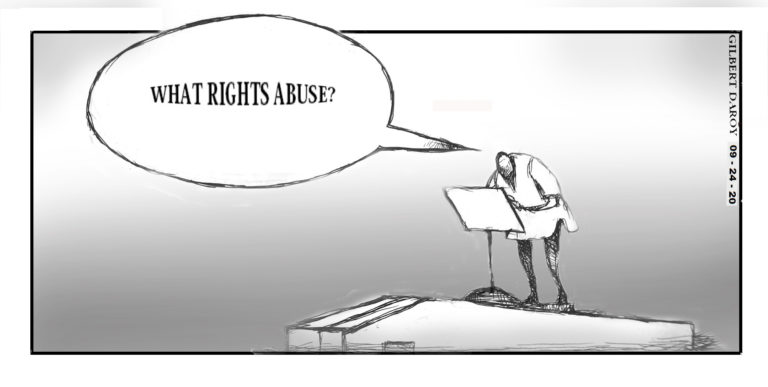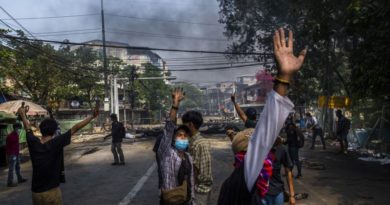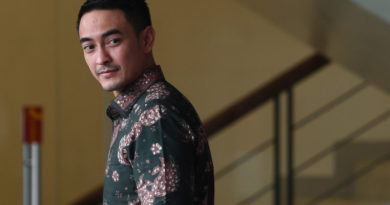EDITORIAL- COLUMNS: Human rights and ‘Tokhang’
.EDITORIAL- COLUMNS
THE EDITOR

Early yesterday morning, President Duterte spoke for the first time before the United Nations General Assembly and used the occasion marking the UN’s 75th anniversary to again dismiss increasingly pointed criticism of his administration’s human rights record.
About midway into the 13-minute recorded speech aired during the opening session of the High-Level General Debate of the UNGA, the President accused unnamed “interest groups” of having “weaponized” the issue of human rights—a tired line that he has kept repeating since he assumed office in 2016.
He refused to acknowledge rights abuses during his administration and stressed to world leaders that the Philippines would “continue to protect the human rights of its people, especially from the scourge of illegal drugs, criminality, and terrorism.”
Mr. Duterte also somehow connected the protection of human rights to terrorism, saying that “detractors [who] pass themselves off as human rights advocates” had used even schools for their “malevolence and antigovernment propaganda.”
“They hide their misdeeds under the blanket of human rights but the blood oozes through,” he claimed.
Yet the blood that has caught the attention of rights advocates and international bodies is that spilled from the victims of extrajudicial killings done in the course of the Duterte administration’s war on drugs. The United Nations is in fact now looking into the possibility of crimes against humanity having been committed in the waging of this very war.
During the 45th session of the Human Rights Council in Geneva, UN High Commissioner for Human Rights Michelle Bachelet expressed concern over the continued reports of drug-related killings, by both police and vigilantes, even amid the COVID-19 pandemic. She cited the “urgent need to revoke the policies that continue to result in killings and other human rights violations.”
Bachelet said her office would “continue to pursue the accountability” of the Duterte administration for the drug-related deaths. She called for action to implement the recommendations made last June, when her office published a damning report detailing “serious human rights violations” in the Philippines, including the rising number of police-related deaths and arbitrary detentions, and, as well, for “independent, impartial and effective investigations into the killings.”
The worsening human rights situation in the country has likewise troubled the elected legislative body of the European Union, which is one of the Philippines’ biggest sources of trade, investments and humanitarian aid. Last week, the European Parliament again threatened to revoke the Philippines’ trade privileges if it would not implement international conventions on human rights. It also urged the International Criminal Court to continue its inquiry into allegations that Mr. Duterte committed crimes against humanity in pursuing the bloody campaign against illegal drugs.


In the resolution approved by an overwhelming majority, the European Parliament expressed its “deepest concern at the rapidly deteriorating human rights situation” in the Philippines.
The concern will apparently be expressed in palpable terms: Unless the Duterte administration demonstrates a “substantial improvement” in its rights record, the European Parliament said, it would initiate procedures that could lead to the temporary withdrawal of the privilege that allows the Philippines to export some 6,200 products tariff-free to the EU member-states.
Will the Duterte administration be driven toward a direction opposite what it has been taking? It doesn’t seem likely. The President’s spokesperson, Harry Roque, even dared the EU to “go ahead” and revoke the country’s trade privileges. And the newly


installed Philippine National Police chief, Gen. Camilo Cascolan, said, ostrich-like, that “there is no such thing as EJK,” ignoring data from the Philippine Drug Enforcement Agency itself that a total of 5,810 drug suspects died in 173,348 anti-illegal drug operations conducted since July 2016. (Rights groups have estimated a much higher death toll.)
In June, Justice Secretary Menardo Guevarra promised the UN OHCHR to undertake an internal investigation of the drug raids conducted under “Oplan Tokhang.” His office is expected to come up with its report in November.
But given the administration’s refusal to even acknowledge the rights abuses committed, Filipinos will have to live with diminished expectations.










